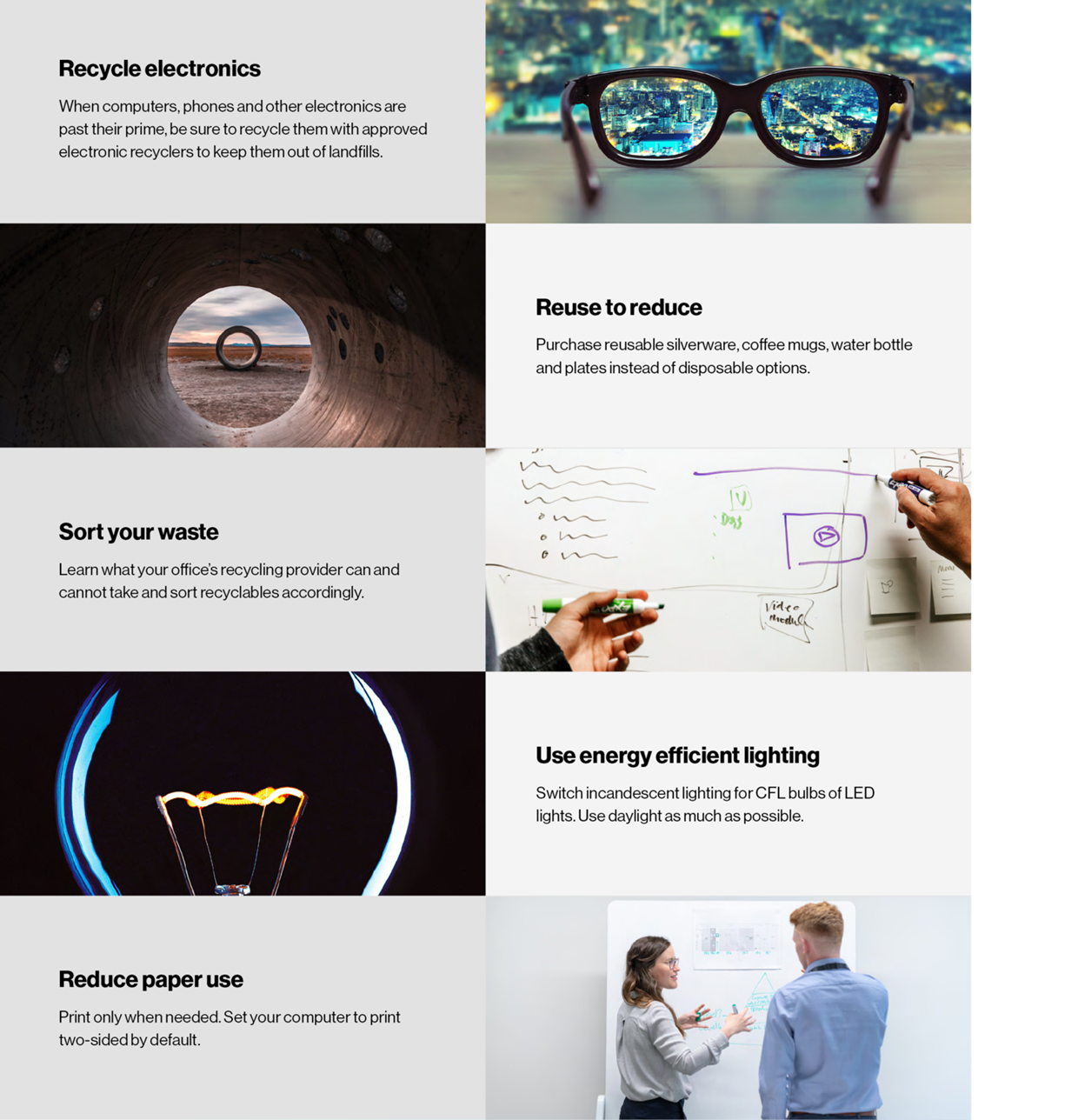Carbon reduction strategy
Our 2030 climate ambition is primarily focused on implementing effective carbon reduction and emission avoidance practices based on an accurate carbon footprint baseline year calculation. This includes continuing to measure our impact and reducing the carbon footprint of our business activities while using our unique expertise to help our clients manage their own environmental impact.
It is important for us to establish a localised approach to our climate commitment strategy; allowing each country to focus on carbon reduction initiatives that directly align with where the data demonstrates the highest carbon impact. We have created a centralised committee, budget and process, to enable and support our employees in reducing their carbon footprint in their country. Some local initiatives within our company have already had measured success.
While we remain engaged with our suppliers regarding their emissions, our efforts are concentrated on reducing our Scope 1 and 2 emissions as well as those from business travel (Scope 3) through targeted initiatives that are within our control.
Green Offices
Our offices where we operate consist of both rented and owned buildings, of which the majority are rented. The emissions associated with energy used for heating, cooling and electricity in our offices account for 29.7% of our Scope 1 and 2 emissions. Within our owned office buildings, we are committed to creating sustainable and energy-efficient workplaces and, where possible, making use of renewable energy suppliers. Although we have less control over energy suppliers in our rented buildings, we encourage our subsidiaries to rent offices that are energy-efficient and we promote energy reduction initiatives such as LED and PIR1 lighting.
1 Passive infrared sensor


Waste management and recycling projects are an integral part of our ESG programme. As we do not manufacture goods, we do not generate packaging or hazardous waste. However, SoftwareOne commits to reducing the volume of waste generated by all our offices by implementing effective waste management and recycling practices. In the future, to standardise our efforts across our company, we will set global targets for this area of concern and include best waste management practices in our Environmental Policy.
Fleet and commuting
Our company cars account for a large proportion of our Scope 1 and 2 emissions and are of the highest priority for our carbon reduction strategy. We take a country-by-country approach to reducing our fleet-based emissions. Regional differences in infrastructure and resources across SoftwareOne demand an innovative, customised approach. To reduce our employees' commuting emissions, many countries already encourage low emission travel such as cycling and use of public transport but in countries where employees need to travel by car, we have car sharing and EV schemes. This initiative has been very successful in the DACH region and the UK is quickly following in their footsteps as they aim to launch their own EV scheme in the first half of 2023.
Business travel
SoftwareOne is a people-centric business and client meetings are an important part of building business relationships. Business travel emissions account for 18.35% of our Scope 3, and are therefore an important part of our carbon reduction strategy. We encourage our employees to make mindful travel decisions by being aware of the emissions associated with their mode of travel and by selecting train travel where possible or choosing economy class over business class travel. While we are in the process of creating a global approach to business travel, some local teams have already taken the initiative to drive policies on this topic. For example, our Acquisitions and Integrations team have set guidelines for their teams to take the train for journeys of less than five hours (or below 500km), and to choose rail over air travel where possible.
Impact financing
SoftwareOne’s ESG team has confidence in our ESG strategies and is actively pursuing new methods to reduce our carbon footprint. Therefore, we are committed to only consider forms of carbon offsetting as a last resort.
While we want to do our best to implement effective carbon reduction strategies that have tangible results within SoftwareOne and our communities, we do not want to pass up on the opportunity to invest in external projects that we believe can have a positive impact on the future of our planet.
Impact financing may be a viable way to invest in sustainability projects such as renewable energy, carbon capture, healthcare and education, taking the focus away from ‘offsetting’ and moving it towards early-stage investment in carbon projects. SotwareOne is reviewing ways to use impact financing in our long-term carbon reduction plan as we work towards our 2030 climate ambitions.